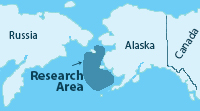 |
|||||||||||||||||||||||||
WELCOME TEACHERS! The Alaska SeaLife Center and COSEE-Alaska are excited to present the second in a series of virtual field trips. Meltdown is a virtual field trip (VFT) designed to immerse students in the important field of polar research as they learn about how a changing climate is impacting sea ice ecosystems in the Arctic. Educators and scientists from across Alaska have teamed up to bring you this new and innovative teaching tool. Meltdown takes students on an Arctic expedition where they'll connect with researchers studying the marine foodweb in the Bering Sea. Throughout this exploration, students will watch videos, examine images, and piece together foodwebs as they follow Dr. Rolf Gradinger and his team of real-life scientists out onto the ice. OVERVIEW FOR TEACHERS This VFT can be used in a number of ways. Teachers may facilitate a structured experience using the curriculum supplements included on this page. Alternatively, individuals may choose to navigate through the pages on their own, learning about sea ice ecosystems and why changes in arctic climate have scientists concerned. Self-guided exploration can be completed in about an hour. GRADE LEVEL: 5th-8th TIME NEEDED: One to eight 1-hour class periods (teachers may choose to use all or some of the supplementary lessons- see teachers guide for details). NUTSHELL: Students will learn about the role of sea ice in the Arctic ecosystem while studying the Bering Sea food web. LEARNING OBJECTIVES:
After completing this virtual field trip, students will be able to: BACKGROUND: At the Northern fringe of the Pacific Ocean, along the United States’ most remote boundary, lies the Bering Sea. Covering an area more than three times the size of Texas (nearly 900,000 sq. mi.), and supporting some of the most valuable fisheries in the world, the Bering Sea’s remote waters have attracted explorers for thousands of years. Now your students can join in the process of discovery as they accompany modern-day explorers onto the ice! In this virtual field trip, students will meet Dr. Rolf Gradinger, a Sea Ice Biologist conducting research in the Bering Sea. They will follow his research team into the field as they work to answer the question 'What does sea ice mean to the Bering Sea ecosystem?' and 'What would it mean if arctic sea ice were to disappear as a result of climate change?' Their quest for answers leads the researchers to look under the ice, where they'll investigate the role of sea ice algae (tiny marine plants that grow on the bottom surface of sea ice during the spring) in the spring Bering Sea foodweb. As your class navigates through this field trip they'll be introduced to the process of science: from initial questions, through development of hypotheses, data collection and, finally, data analysis. Watch as an unfamiliar world unfolds, revealing a complex spring foodweb all stemming from the sea ice algae. The research of Drs. Rolf Gradinger, Katrin Iken and Bodil Bluhm inspired this virtual field trip. Join us as we explore how climate change may impact one of the world's most productive marine ecosystems, the Bering Sea. We also recommend listening to Encounters Radio: Ice Algae, a recorded interview in which host Elizabeth Arnold interviews Rolf Gradinger about this research project. (10 minutes) TO USE THIS VIRTUAL FIELD TRIP YOU WILL NEED:
- Internet access, video-streaming capabilities UNABLE TO RUN THE STREAMING VERSION? REQUEST A COPY OF ALL MATERIALS ON CD BY EMAIL: education@alaskasealife.org SPECIAL NOTES FOR TEACHERS:
Guide to State & National Standards addressed in this field trip (Click to download .pdf)
Videos and weblinks
Vocabulary
Age appropriateness ADDITIONAL RESOURCES: Resources for Invertebrate Research Project: OCEANUS: Arctic Ecosystem Interactive Arctic Ocean Diversity Project: Species Info ARKive: Marine Invertebrates Info General information about Sea Ice: National Snow and Ice Data Center NASA Earth Observatory: Sea Ice International Polar Year: Sea Ice Fact Sheet Resources highlighting Bering Sea & Arctic Ocean research and education: BEST-BSIERP-Bering Sea Project Bering Sea Project: Profile on Sea Ice Arctic Ocean Diversity Project Education Resources Related to Climate Change: NOAA Education Resources: Climate Change Impacts Contact Us: If you have any questions about this virtual field trip, please contact the Alaska SeaLife Center Education Department at education@alaskasealife.org or 907-224-6306. For more information on classes we offer, including our inquiry-based 50-minute Distance Learning programs, visit our website at www.alaskasealife.org.
|
CURRICULUM SUPPLEMENTS Use the .pdf links below to access classroom activities for each section of the MELTDOWN virtual field trip.
|
||||||||||||||||||||||||
 |
|||||||||||||||||||||||||



